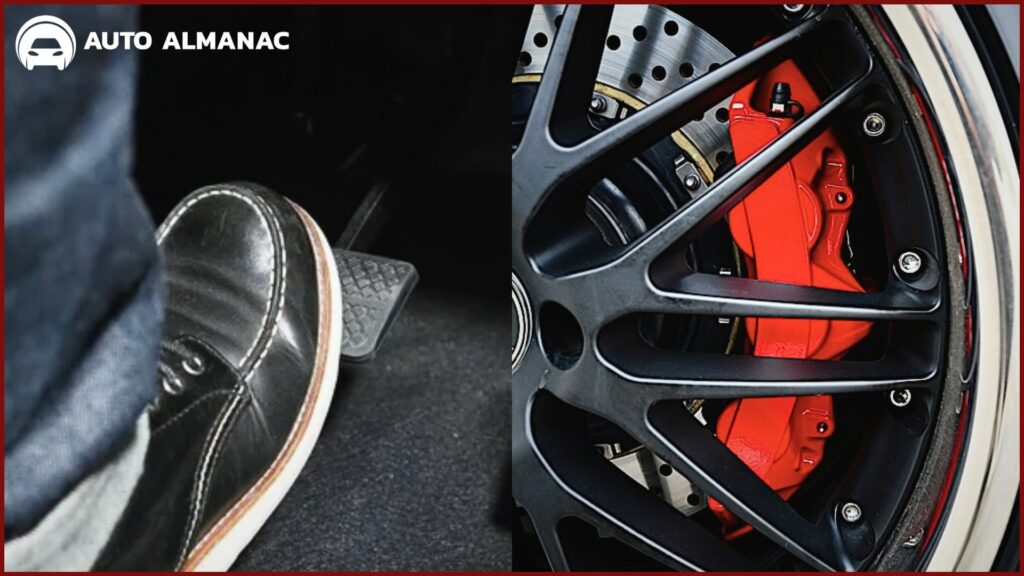If you’re a curious bunch like us, then you probably like to explore whatever it is you can get your hands (or feet) on inside your car, including something as simple as a brake pedal.
Explore long enough and you’re bound to discover that the brake pedal feels as stiff as a rock if your car’s not running but otherwise soft when it is.
We’ve been in the same boat, but thankfully, we’re now wise enough to share with you why the pedal works that way in this guide! (and also wise enough to urge you not to put a brick on the thing).
Why is the brake pedal hard when the car is off and soft when on?
The brake pedal feels harder when the car is off since there is no vacuum or assistance from the brake booster. It only softens up when the brake booster activates upon start-up.
However, there may be an issue with your braking system if the pedal feels too hard or too soft when it shouldn’t be.
With how the braking system of cars works, it’s to be expected that the brake pedal would feel a lot stiffer if you don’t have the car turned on since the brake booster would not be providing a vacuum or assistance.
Once you turn on the engine, it’ll generate a vacuum to activate the brake booster, which is key in keeping the brake pedal feeling “softer” as it should be while you’re driving.
What’s not considered normal is if the brake pedal feels either too hard to push down while you’re driving or feels too soft that you can easily push it all the way to the floor.
Now as for why this happens, it’s most likely due to a fault somewhere in your braking system components, and we’ve outlined every single one of these causes down below!
1. Bad Brake Booster/Vacuum Diaphragm
One of the most common reasons why your car’s brake pedal can stiffen up is due to a fault in the brake booster, which is responsible for amplifying the force you use to push down on the pedal using vacuum pressure.
The brake booster provides vacuum assistance for the brake pedal by using a 2-sided vacuum diaphragm, where one side gets fed atmospheric pressure when the brake pedal is pushed and receives vacuum again when the pedal is released.
The problem arises when the vacuum diaphragm gets torn and is not able to maintain the vacuum pressure that’s needed to keep the brake pedal soft while it’s being pushed down.
Since the vacuum diaphragm is a crucial component of the brake booster, you’ll have to replace the entire brake booster in order to restore its ability to hold vacuum pressure and prevent a hard brake pedal.
2. Bad Check Valve
The check valve is another important part of the braking system that serves a dual purpose, which is to hold the vacuum inside the brake booster while the engine is switched off and also to prevent air bubbles from forming in the brake line.
However, when you have a bad check valve, it’ll also cause the brake booster to not maintain adequate vacuum pressure, similar to when you’ve got a problem with the vacuum diaphragm.
This also means that in the event that your engine fails, you will not have a backup source of vacuum pressure to apply to the brakes’ master cylinder, which is what actually applies hydraulic pressure to activate the brakes.
Through this, you can see how a faulty check valve can affect other brake components and result in a stiffer-feeling brake pedal.
The good news is that the check valve is a separate one-way valve that’s only connected to the brake booster, which means that you can easily get it replaced without having to replace the brake booster itself.
3. Bad Master Cylinder
The brake master cylinder is a component of the braking system that’s responsible for applying hydraulic pressure to the brake caliper to slow down the vehicle.
The master cylinder is also the very part that converts the brake booster’s vacuum pressure into hydraulic pressure by the use of pistons to push hydraulic fluid through the brake lines.
If anything were to go wrong with it, the master cylinder can cause your brake pedal to either feel stiffer or feel too soft or spongy that it can easily sink to the floor.
A bad master cylinder can also cause your brakes to lock up or lose their braking power, making it a pretty big safety hazard especially when you’re driving at speed.
Additionally, you may even experience brake fluid leaking from the cylinder itself if one of its rubber seals wears out or breaks.
If you’re ever experiencing any of these symptoms above, then you should get your brake master cylinder as well as your brake fluid levels inspected.
4. Bad Vacuum Pump or Power Steering Pump
Certain vehicle models utilize a different approach to their braking system by using either a separate vacuum pump or the power steering pump to provide the braking power.
Instead of using vacuum pressure directly from the engine, such pumps can act as brake boosters to apply the needed pressure to slow the car down. In the case of the power steering pump, it uses hydraulic pressure instead.
But regardless of the kind of brake booster that your vehicle has, it can still potentially fail and leave your brake pedal a lot harder to push down than before.
If the vehicle has an electrically powered pump, then it can potentially malfunction and cause brake issues. The same thing goes for a power steering pump that does not have enough fluid to keep a constant hydraulic pressure for the brakes.
Other symptoms you may notice when such brake boosters fail as you’re pushing on the brake pedal are inconsistent braking performance, the brake lights flickering on and off, and even leaking brake fluid.
In either case, you would want to have your vacuum pump brake booster or hydraulic brake booster checked out as soon as you can, as it can significantly decrease your car’s ability to slow down within a certain distance.
5. Improper Brake Pedal Ratio
If you’re having trouble with your car’s brake pedal not feeling right, then you can also consider checking if its pedal ratio has been set incorrectly.
The pedal ratio is calculated by dividing the distance of the center of the footpad to the center of the pedal pivot point (A) by the distance of the master cylinder’s pushrod to the pedal pivot point (B).
Every vehicle has a set pedal ratio depending on the type of braking system that it has, and if the ratio is off by even 1/4 of an inch, then you’ll experience problems with your brake booster not being able to reach and activate the master cylinder.
In addition, you could also experience a decrease in brake pressure within the system, which is what causes the brakes to feel harder than usual.
The usual pedal ratio for manual brakes is between 5:1 and 6:1, while power brakes typically have a pedal ratio of 4:1 to 5:1.
If you’re neither familiar with your car’s recommended brake pedal ratio nor the procedure to adjust it, then we highly recommend taking your car to a professional mechanic to have it properly adjusted.
6. Fluid Leak or Vacuum Leak
If you develop a leak somewhere in your braking system, then it can cause your pedal to either feel too hard or too soft depending on the type of leak.
In the case of brake fluid leaks, you will experience a drop in hydraulic pressure due to the brake fluid levels also dropping below what’s required to maintain the pressure.
As a result, the reduced hydraulic pressure will make your brake pedal feel softer and spongier, to the point that you can easily push the pedal all the way down, albeit having reduced braking performance.
One of the usual culprits of leaking brake fluid is a damaged or worn-out brake line, so it’s important to have it replaced immediately after confirming that it’s the source of the leak.
Another type of leak that can cause issues with your brake pedal feel is a vacuum leak. But unlike fluid leaks which cause a soft and spongy pedal, a vacuum leak can result in a harder or stiffer brake pedal instead.
A vacuum leak in your braking system will affect the brake booster’s performance, which is in charge of maintaining vacuum pressure so that it can properly provide assistance when the pedal is pushed.
Vacuum leaks can form when you have a damaged brake vacuum hose, though it can also be a fault in the brake booster itself. In either case, you’ll have to get your braking system inspected to find the exact source of the vacuum leak.
7. Buildup of Brake Fluid Residue
Your entire braking system heavily relies on the brake fluid that you use, as it needs the fluid to send enough hydraulic pressure to actually apply the brakes.
Hence, if your brake fluid gets too dirty or some amount of moisture gets mixed in with it, it can negatively affect its performance when you step on the pedal, which in turn can affect how hard you’ll have to push down.
Water or moisture can mix with and contaminate the brake fluid if it’s exposed to air, and it’ll likely cause a buildup of sludge or residue within your brake lines that impede the normal flow of brake fluid.
In this case, it’s recommended to check the condition of your brake fluid via its reservoir. If it already appears thicker and darker, then it’s about time that you get it flushed and replaced with new brake fluid.




